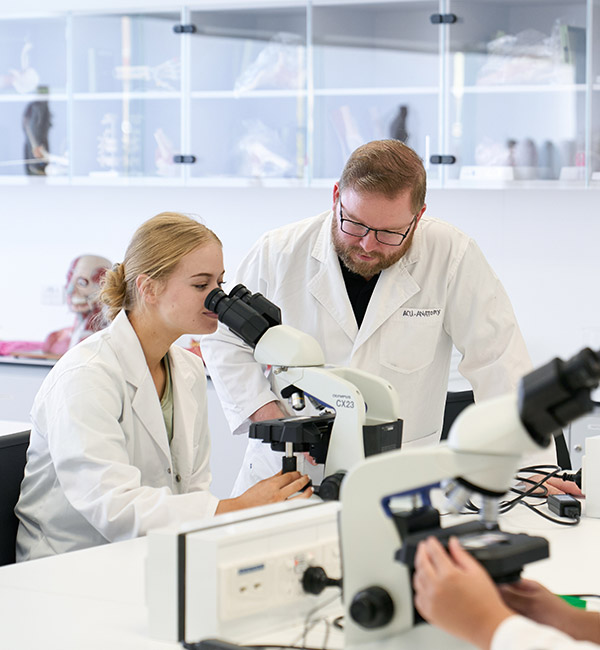Bachelor of Biomedical Science
Course information for - 2026 entry
Domestic
- Domestic
- International
- Domestic
- International
Offered at 3 locations
- Brisbane
- Melbourne
- North Sydney
- Brisbane
- Melbourne
- North Sydney
- Duration
- 3 years full-time or equivalent part-time
- QTAC code
- 115941
- ATAR
- 58.50 for Brisbane
- Fees (first year)*
- Start dates
-
Semester 1 intake: Beginning February 2026
Applications open August 2025
Midyear (Semester 2) intake: Not offered this intake
Overview
Find the human body fascinating? Study a Bachelor of Biomedical Science at ACU and you’ll learn about the cause, nature, progression, and consequences of diseases, understand how they are diagnosed, and explore research aimed at their prevention and treatment. You'll also gain laboratory experience in areas such as chemistry, biochemistry, cell biology, anatomy and physiology, pathophysiology, pharmacology, genetics, microbiology and immunology. You will have the opportunity to complete a major in physiological pharmacology or a minor in pharmacology by enrolling in this degree.

Professional experience
You will be required to complete 60 hours of community engagement and up to 105 hours of industry immersion.
Work placement
In biomedical science there are opportunities throughout the third year of the program to undergo up to 105 hours of industry immersion to develop knowledge and skills related to biomedical science careers.
Your workplace learning will require you to address an issue or problem of a biomedical or related nature over the course of your immersion experience. The problem will be defined in consultation with your Unit Coordinator and the industry contact, and you will undertake exploratory work to find a solution or answer to address the issue.
Previously, students have experienced placements in medical research centres and labs, such as Tom Mandel Islet Transplant Program and the Peter MacCallum Cancer Centre, and pharmaceutical companies, such as Bayer.
During placements, students have been involved in a variety of tasks such as managing and operating sensitive scientific equipment (e.g. PET scanners and microtome), they have conducted histology techniques on various types of tissues, sample preparation and embedding. Students have honed their communication skills for the purpose of scientific writing and consumer medical information.
Visit the faculty’s Work Integrated Learning (WIL) webpage to view opportunities in biomedical science.
Community engagement
Community engagement gives you the opportunity to work within society to enhance the dignity and wellbeing of people and the community. You will volunteer at a selected public sector or non-profit organisation supporting disadvantaged individuals and families experiencing socially determined health issues.

Careers
The course prepares graduates for work as:
- research scientists
- pharmaceutical scientists
- clinical trial coordinators
- clinical trials researchers
- scientific journalists and writers
- technical officers or laboratory assistants
Graduates have pursued careers in:
- pharmaceutical and medical technology industries
- health regulation
- health education
- patient advocacy
- consumer health program development
- hospitals and public health
- science communication
- academic research
- medical marketing and sales
Course details
Course structure
To complete the Bachelor of Biomedical Science, a student must complete 240 credit points (cp).
Available Major(s)
-
Physiological Pharmacology
The physiological pharmacology major sequence provides you with the opportunity to expand your understanding of the human body and of the various types of medication that cure/manage disease states. If you choose this stream, you will gain a deep understanding of the anatomy and physiology of the cardiovascular, nervous, renal, and gastrointestinal systems and how drugs exert their desired effects on the human body, what protocols exist that ensure drug safety and how new drugs are developed.
Available Minor(s)
-
Pharmacology
In the pharmacology minor stream you will gain a thorough understanding of the function of the nervous, renal, and gastrointestinal systems and how drugs exert their desired effects, how new drugs are developed, and what protocols exist to ensure drug safety and compliance.
-
Course map
Graduate statement
AQF framework
Additional course information
Classes
Class sizes: Your class size will depend on the unit you are studying and if that unit is taught across different degrees. The tutorial, lab and workshop class sizes are normally capped at 24 students. When content delivered needs to be monitored more closely, a teaching assistant will be present in the classroom.
Contact hours: Most units will require you to attend three to five hours of classes in the form of a lecture, tutorial, lab or workshop on campus.
Some of these (e.g. lectures) may be online, and you will be required to watch, read and listen to materials provided as an alternative to attending face-to-face classes.
Therefore, if you are a full-time student taking four units in a semester, that will add up to 4 x units by 5 hours (maximum) = 20 hours required on campus or engaging in content. You will also need to set aside dedicated time each week for study and preparation of assessment tasks.
Sample Assessments
Each unit has three assessments per semester. Assessment tasks include video presentations, group work, hands-on practical tasks, online quizzes, and online or in-class written assignments.
If the unit has a final exam, it is counted as part of the three assessments. Assessments have different weighting percentages towards your overall mark. A single assessment cannot be worth more than 50 per cent of your assessment total. The format of assessments is different for every unit and will be explained by your lecturer prior to the due date.
Overseas study available
The Faculty of Health Sciences has partners all over the world and continues to grow the international experience offerings in biomedical science.
There are opportunities to study the Core Curriculum abroad in Rome, Beijing, New York, or Leeds.
Entry requirements
An applicant must also comply with the Admission to Coursework Programs Policy.
International students need to meet the English Language Proficiency requirements as defined in the Admission to Coursework Programs Policy.
| State | Prerequisites |
|---|---|
New South Wales | Any two units of English (Standard) (Band 3) or English as an Additional Language or Dialect (EALD) (Band 4), and any 2 units of one of the following (Band 2): Mathematics, Biology, Chemistry or Physics. |
Queensland | English (Units 3&4, C) and Units 3&4, C in any of the following: General Mathematics, Mathematical Methods, Specialist Mathematics, Biology, Chemistry or Physics. |
Victoria | Units 3 and 4: a study score of at least 25 in English as an Additional Language (EAL) or at least 25 in English other than EAL, and a study score of at least 25 in either Mathematics (any), Biology, Chemistry or Physics. |
Disclaimer: The course entry requirements above are for 2026 Admission. Refer to your relevant Tertiary Admission Centre website for future years' entry requirements.
View transparency admission information
Applicants with recent secondary education
You’ll need to meet the minimum entry requirements and subject prerequisites for your chosen course.
If your school result was affected by circumstances outside of your control, such as financial hardship, illness, disability or a challenging home environment, you may qualify for an access scheme. You can apply through your TAC as part of your application process.
Applicants with vocational education and training (VET) study
You’ll need to meet the minimum entry requirements and subject prerequisites for your chosen course.
For current year 12 students
If you’re a current Year 12 applicant you can be given a selection rank separate from, and in addition to, your ATAR if you’ve completed a competency-based and graded AQF Certificate III or above.
For non-school leavers
If you’ve completed, or are completing a competency-based AQF Certificate IV or AQF diploma you will be assigned a selection rank by your local Tertiary Admission Centre (TAC). This is an entry score based on your individual qualifications and achievements.
ACU has partnerships with TAFE and many private education providers. If you have completed a qualification with one of these partners or with ACU College, you may be eligible for guaranteed entry and/or credit into a related ACU degree. Please apply through your local TAC and then submit a credit application for your previous study.
Applicants with higher education study
You will need to meet the minimum entry requirements and subject prerequisites for your chosen course.
If you have completed at least two units of AQF-recognised study at bachelor level or above, we’ll assign you with a new selection rank that reflects your study level, duration, and grade point average.
If your prior study or relevant work experience has provided you with knowledge, skills or experience aligned with the learning outcomes of units in your new course, you may be eligible to gain credit for study or have your prior learning recognised. This means you may be able to complete your ACU course in a shorter timeframe.
You can use our credit search tool to see what you might be eligible for. For more information about credit and recognition of prior learning at ACU, follow the link below.
Applicants with work and life experience
You’ll need to meet the minimum entry requirements and subject prerequisites for your chosen course.
If you have no formal education qualifications you may be eligible for a selection rank based on your work, life or service experience.
- If you’ve been in paid employment, relevant to the course you’re applying for, for a minimum of six months full-time (or equivalent), this work may be assessed for your selection rank.
- If you’re 21 years or older you can sit the Special Tertiary Admissions Test (STAT) through your local TAC.
- You can apply for an ACU bridging course. Our bridging courses allow you to transition back into studying and can give you a head start on the relevant undergraduate degree.
- If you have served in the defence force, your rank and time in service may contribute to your selection rank.
English language requirements
Applicants require an academic IELTS minimum overall score of 6.5 (with a minimum score of 6.0 in all bands), or an equivalent acceptable test score as outlined in the Admission to Coursework Programs Policy (see English Language Proficiency).
Adjustment factors
If you’re currently completing Year 12 you may be eligible for adjustment factors that can boost your rank and help you get into your desired course.
Adjustment factors may be applied to your TAC application if you study particular subjects, attend schools geographically close to our campuses or in certain regional areas, apply as an elite athlete or performer or meet certain other criteria.
Inherent requirement
There are essential components of a course or unit that demonstrate the capabilities, knowledge and skills to achieve the core learning outcomes of that course or unit. You will need to be able to meet these inherent requirements to complete your course.
Learn more about inherent requirements for your course and how they affect you
Pathways
Pathways into course for current or recent Year 12 students
If you can’t meet the ATAR requirement for your choice of course and you’re currently completing Year 12 or finished Year 12 in the two years previously, we have entry programs to get you where you want to be.
Pathways into course for applicants with previous study and/or life experience
Are you applying to ACU as a non-school leaver?
By that we mean, you’re not currently completing Year 12 and haven’t completed it in the two years previously. If the answer is yes and your selection rank isn’t enough to meet the requirements for your desired course you still have a number of options to help you achieve your study goals.
If you’re over 21, you can sit the Special Tertiary Admissions Test (STAT) , or you can complete a diploma or bridging course relevant to your desired course.
Further study
An honours year is available to meritorious students, with a grade point average of 5.5, who meet the admission requirements for the Bachelor of Biomedical Science (Honours).
High-performing students will have the opportunity to gain a position on the facilitated interview pathway to the University of Notre Dame’s Doctor of Medicine (MD) in Sydney (T&Cs apply*).
*An ACU student must: (1) present a GPA greater than or equal to 6.0 over the entire program, (2) sit the GAMSAT test and achieve an overall GAMSAT score greater than or equal to 55, (3) complete the Casper situational judgement test, and (4) be ranked by Notre Dame in the top 5 of ACU's Biomedical Science applicants applying for the MD program who have not otherwise been offered an interview. An offer of interview does not guarantee an offer of entry into the program.
Further, this offer is exclusive to those students who have applied for the MD program through the Graduate Entry Medical School Admissions System (GEMSAS) and listed the Notre Dame School of Medicine, Sydney as their first preference.
Fees
Course costs
*This is an indicative first-year fee based on the tuition fee rates for a full-time student, using unit enrolment data from domestic students who studied the course in the previous year.
A student’s annual fee will vary depending on factors including:
- Number of units studied per year
- Choice of major or specialisation
- Elective units
The University reviews fees annually.
You can view current course costs and domestic tuition fee rates by unit.
Payment options
You should be able to concentrate on getting good marks instead of worrying about how you’ll pay your fees. We have a number of options that can help you ease the financial burden, including government assistance, scholarships and income support.
Scholarships
You could be eligible for one of the hundreds of scholarships we award each year to help students from across the university with the cost of studying, accommodation or overseas study opportunities. Some of our scholarships are awarded on the basis of merit, but these aren’t just for the academically gifted; ACU also recognises excellence in community engagement and leadership. We also offer a range of scholarships for those who may be struggling financially or who have faced other barriers to accessing education.
How to apply
Domestic applicants
Direct application
Apply nowWe are happy to accept your application to this course. Remember, Victorian applicants can apply direct to ACU only if
▪you have not yet commenced a VTAC application and
▪you are not currently studying Year 12, and
▪you are applying to only one course only.
Deferment
Deferment is available for one year. Find out more about deferment: Deferment Information.
Staff Profile
Associate Professor Pre de Silva
Associate Professor, School of Behavioural and Health Sciences
Associate Professor Pre De Silva lectures in chemistry at our North Sydney Campus. She obtained her PhD from the University of Aberdeen (UK). Before joining ACU, she worked as a lecturer at the University of Ruhuna (Sri Lanka), as a postdoctoral research associate at the University of Lancaster (UK), and then as a research scientist in the Manufacturing and Materials Division at CSIRO. Dr De Silva has extensive research experience in wider areas of chemistry, including novel biomaterials for bio-medical applications, utilisation of industrial wastes in the development of eco-friendly, low-carbon binders and carbon dioxide mineral sequestration.
Dr Santha James
Senior Lecturer, School of Behavioural and Health Sciences
Dr Santha James joined ACU with a rich multicultural experience of learning, teaching, curriculum development and research from institutions in India, Lesotho, South Africa and Australia. She is one of the founding members of the Bachelor of Biomedical Science programme and the combined degrees with Laws, Business and Applied Public Health. She led the course development and implementation as the National Course Coordinator for Biomedical Science from 2015 to 2019 and continues her contributions to teaching and curriculum development as Senior Lecturer in cell biology, anatomy, physiology, pathophysiology and genetics. She believes in inspiring students through her continuing love of learning and research. Santha was awarded an ACU Citation for Outstanding Contributions to Student Learning for engaging students from diverse backgrounds in the science curriculum and inspiring them for critical thinking and lifelong learning through passionate and scholarly teaching. She continues to seek new knowledge regarding teaching and learning through her research into student learning styles and students’ acquisition of science concepts at ACU.
Testimonial

“I have always had an interest in science and medicine. The Bachelor of Biomedical Science at ACU allowed me to study the subjects I enjoy, and there’s a wide range of career options for graduates. The small class sizes at ACU meant I got individual feedback and support from my lecturers. I got the most out of my time spent in class.”
Have a question?
We're available 9am–5pm AEDT,
Monday to Friday
If you’ve got a question, our AskACU team has you covered. You can search FAQs, text us, email, live chat, call – whatever works for you.






